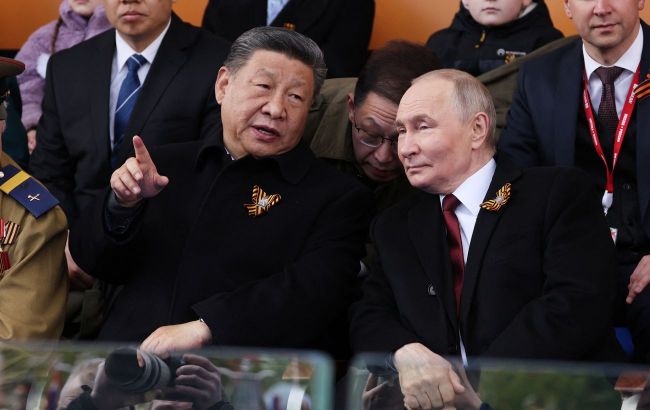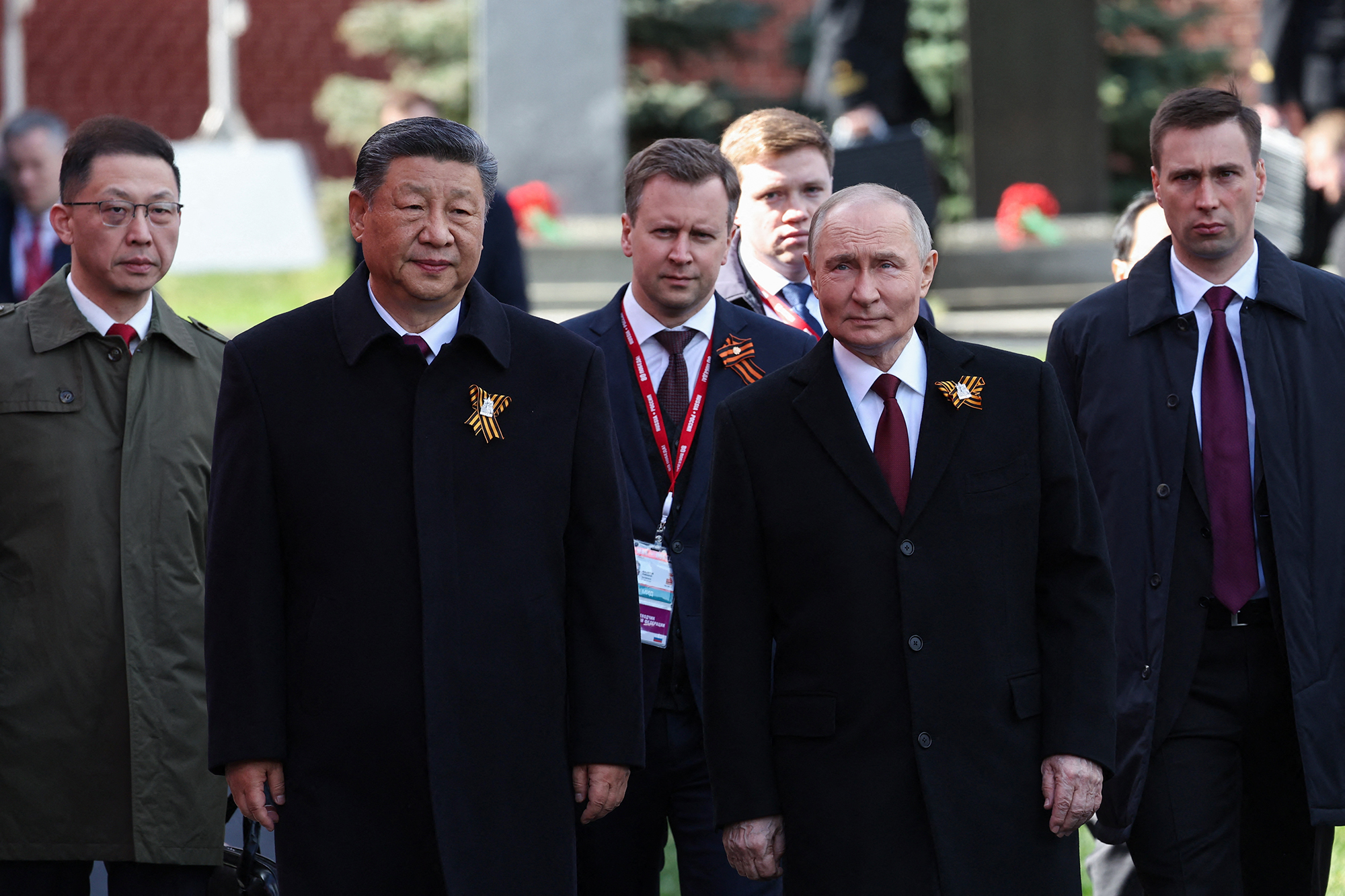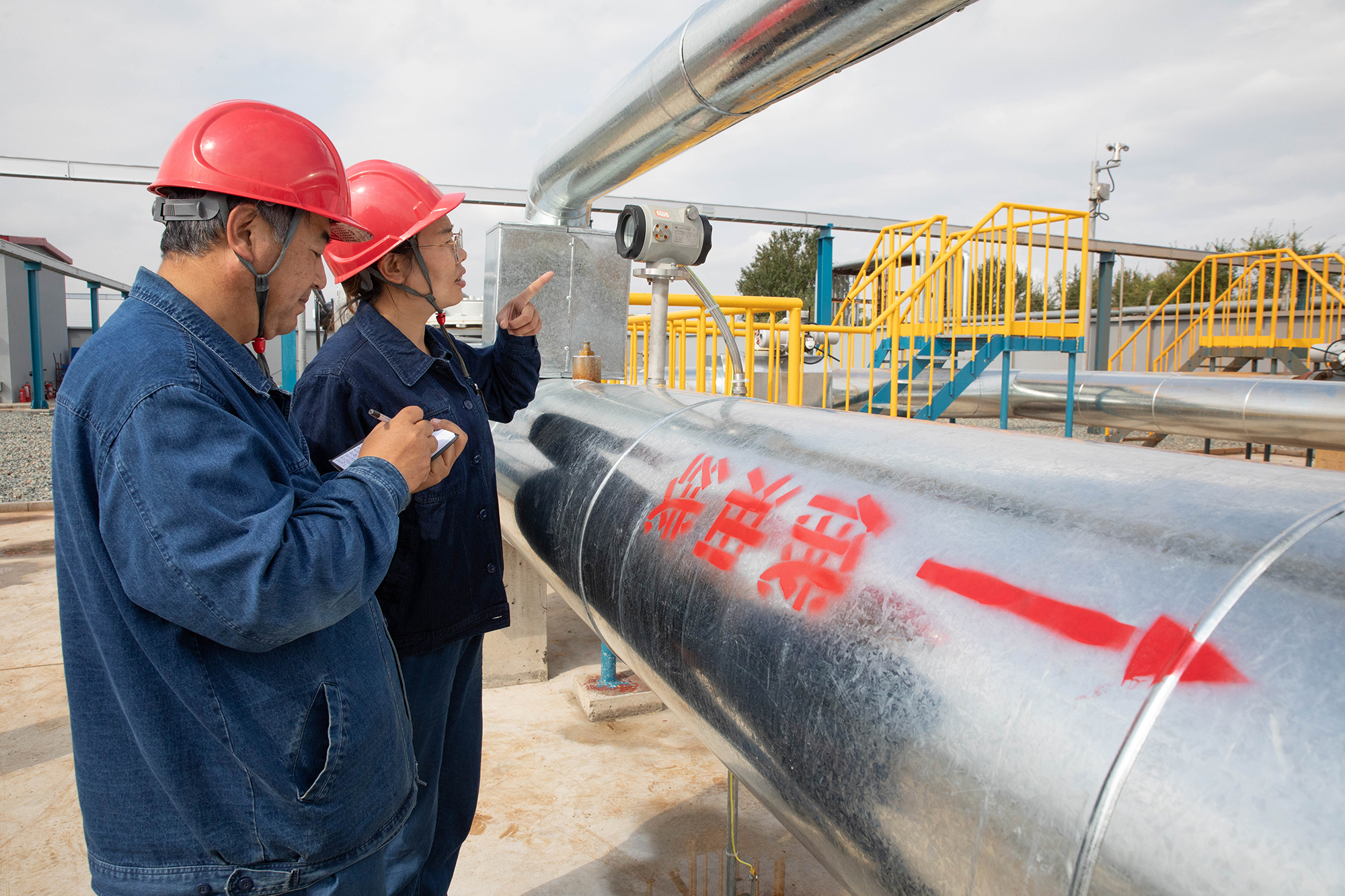China factor: Why Beijing keeps Russia's economy afloat and what's US and EU response
 Chinese leader Xi Jinping and Russia's Vladimir Putin at a military parade in Moscow (photo: Getty Images)
Chinese leader Xi Jinping and Russia's Vladimir Putin at a military parade in Moscow (photo: Getty Images)
Why China continues to support Russia in the war, what Ukraine's Western partners are doing to stop it, and why they have not yet succeeded are analyzed in the article by RBC-Ukraine.
Key questions
- What is China's strategy towards Russia?
- How have the US and the EU intensified their contacts with China in the context of ending the Russian-Ukrainian war?
- Why are the US and the EU still limiting themselves to statements without real pressure?
- What are the chances that Europe and the US will move from words to action?
"Hopefully, China can help us stop the war with, in particular, Russia-Ukraine, and they have a great deal of power over that situation, and, we'll work with them," Donald Trump said on January 23, in the early days of his presidency.
These words were expected. Ukraine has long been trying to convey to its partners the idea that it is thanks to China that Russia can continue the war. As statements by European and American politicians show, Brussels and Washington understand the destructive role of China, but there are nuances. Therefore, real measures to limit China's role in the war are rarely taken.
Nevertheless, in recent months, contacts between the US and China, as well as between China and the European Union, have intensified. This gives at least a faint hope that China's position may change somewhat.
China's rear guard for Russia
Officially, Beijing declares its neutral position and advocates negotiations, a ceasefire, and peace. However, as RBC-Ukraine wrote, almost everything the Russians need to continue the war is coming from China almost openly. According to the Foreign Intelligence Service of Ukraine, at the beginning of 2025, 80% of the critical electronics for Russian drones were of Chinese origin.
Ultimately, China indirectly finances Russian aggression to its advantage by buying oil and gas from the Kremlin. Moscow has offered Beijing a discount — according to the Russian Ministry of Economic Development, by 2027, the cost of Russian gas for China will be 28% lower than prices for Europe and Türkiye.
It is unknown how much profit Russia makes from exports to China. The final price of oil is a commercial secret. However, even minimal income plays into Russia's hands, as it allows it to keep wells in working order rather than carrying out costly and complex conservation measures.
"Russia would clearly face the problem of where to offload its oil. Second, the problem of reduced revenue from oil sales. And third, the question of what to do with extraction," Mykhailo Honchar, president of the Strategy XXI Global Studies Center, told RBC-Ukraine earlier.
But there are other trends. For example, Russian coal exports to China have fallen sharply since the end of last year. Combined with the closure of the European market to Russia, this has already led to mass closures of mines in Russia's coal-producing regions and local economic crises. According to The Moscow Times, 51 of 179 coal enterprises in Russia are under threat of closure. In addition, China has stopped purchasing winter wheat and barley from Russia, which is hitting Russian farmers hard.
China's goals in the Russian-Ukrainian war
This policy — where China provides limited assistance to Russia on the one hand, while weakening it on the other — has a clear logic from Beijing's point of view.
"For China, the key issue is that Russia remains in the hands of the current regime (under Putin's rule – ed.). China does not want a pro-Western regime on its 3,200-kilometer border. Therefore, a slow-moving war in which Russia neither loses nor wins is best for China," Serhii Korsunskyi, a diplomat and former Ukrainian Ambassador to Japan, told RBC-Ukraine.
If Russia loses the war, several possible scenarios open up at once. The most threatening for China is the overthrow of Putin's regime and the coming to power of forces that are committed to restoring relations with the West.
 Xi Jinping and Vladimir Putin (photo: Getty Images)
Xi Jinping and Vladimir Putin (photo: Getty Images)
At the same time, Russia's victory in the war will make Putin's regime even more aggressive and arrogant. And not only towards Europe, but also towards China itself. Despite declarations and assurances of strategic partnership, there are many contradictions between China and Russia, including territorial ones. But at the very least, Russia will be able to pump up China's rights regarding energy supplies.
That is why, for example, there is no talk yet of direct supplies of Chinese weapons to Russia. And they could significantly strengthen the aggressor. So far, Russia receives direct military aid only from North Korea and, to some extent, from Iran.
However, the context of relations with the US remains central to China's strategic calculations. Chinese Foreign Minister Wang Yi recently told EU chief diplomat Kaja Kallas that China cannot accept Russia's defeat in the war against Ukraine, as this could allow the United States to focus all its attention on China. Although these words were revealed by the Hong Kong news agency South China Morning Post concerning unnamed sources, there are all signs that such a leak was controlled, meaning that China sent a clear signal to the whole world.
US-China: Difficult dialogue
The US and China, the two most powerful countries in the world today, have long been competing for influence, from Southeast Asia to Africa and Latin America. Trump personally is concerned about the serious trade imbalance with China. Ultimately, the two countries are competing for technological leadership globally, particularly in the field of artificial intelligence. All these factors overlap.
"China needs cheap energy sources because it is in a race with the United States for artificial intelligence. AI requires incredible amounts of energy. To provide it, you need to have these sources. Russia is the ideal supplier,” Serhii Korsunskyi told the agency.
In this context, the island of Taiwan, with its very specific international status, is also important for China. Among other things, the island is known for being home to the most advanced chip manufacturing companies. Formally, China declares its desire to return Taiwan, but so far has not taken any real steps in this direction. However, according to Korsunskyi, this prospect is quite real. And this means the possible involvement of the US in the defense of Taiwan, with the likelihood of being drawn into a full-scale war with China.
Currently, there are noticeable signals from the US that should reduce tensions around Taiwan. On July 29, the US allowed the American company NVIDIA to supply China with advanced H20 chips for artificial intelligence.
"This is what China lacks. It can only get it from Taiwan. And the fact that the US has allowed NVIDIA to supply them to China is a compromise," says Serhii Korsunskyi.
At the same time, trade negotiations between the US and China continue. In 2024, China exported approximately $439 billion worth of goods to the US, while the US supplied only $144 billion worth of goods to China. Thus, the trade deficit reached $295 billion, which is approximately 1% of US GDP.
Trump's goal in the negotiations is to create conditions for a gradual reduction in the trade deficit and, at the same time, to obtain preferences for American suppliers in China. A meeting between the two delegations on this issue took place on July 28-29 in Stockholm. No agreement was reached, although both sides agreed to continue the dialogue.
If no progress is made, Trump threatens to reinstate draconian trade tariffs on all Chinese products. In addition, in the context of China, the US is increasingly talking about introducing secondary tariffs. This is an additional penalty for purchasing Russian energy resources, which will be added to the basic tariff. Moreover, a precedent for this already arose last week.
On August 6, Trump issued an executive order imposing an additional 25% trade tariff on imports from India, which purchased Russian oil. According to the decree, if it is established that another country directly or indirectly imports Russian oil, a proposal to impose an additional 25% tariff against that country will be submitted to the US President for consideration.
At the same time, India and China are not equivalent for the US in this context. Although the volume of trade between the US and India is relatively significant in absolute terms, it is not so critical in the context of the entire US economy. Beijing, on the other hand, is a key trading partner of Washington, so even 25% tariffs will have a significant impact on the cost of Chinese goods for ordinary Americans and on the US economy as a whole. In some areas, such as rare earth metals, the US's dependence on China is critical. These are things that Trump has to take into account.
The US President briefly imposed trade tariffs on China in May this year, but then suspended them for 90 days. That period expires today, August 12. But just hours before the deadline, Trump, according to CNBC, postponed the tariffs against China for another three months.
At the same time, the state of its economy remains key for China. The country already has structural problems due to the growing crisis in the real estate market, rising local government debt, and falling domestic consumption. And potential losses from new US tariffs could make things worse.
China will make its final decision on Russia and a broader agreement with the US, taking into account all these factors and after the US takes appropriate steps, if any. September 3 will be a good occasion for this, as Donald Trump is expected to meet with Chinese leader Xi Jinping on the 80th anniversary of the end of World War II.
However, even if an agreement on Russia becomes part of the Trump-Xi deal, it will not necessarily be made public, given the Chinese mentality.
"China cannot publicly agree to this pressure. These statements about energy sovereignty, that they will decide from whom and what to buy, they could not say otherwise. They need to save face in this situation," political scientist Ihor Reiterovych told RBC-Ukraine.
 The Eastern Siberia-Pacific Ocean oil pipeline connecting Russia and China (photo: Getty Images)
The Eastern Siberia-Pacific Ocean oil pipeline connecting Russia and China (photo: Getty Images)
Ukrainian authorities are considering two scenarios. The first is that China will decide not to escalate tensions with the US for now and will gradually encourage Russia to end the war. The second is that China will choose to escalate tensions with the US, in which case its assistance to Russia will continue or even increase.
But even if a direct agreement with China cannot be reached, the US has the means to restrict Russia's access to many dual-use goods. The main thing is political will.
"The semiconductor market is controlled by four American companies (NVIDIA, Intel, AMD, and Applied Materials — ed.). Minimal steps have already been taken: paragraphs in contracts prohibiting sales to Russia, and preventive measures. But companies are not yet responding if these measures do not work," said Pavlo Shkurenko, an advisor on sanctions policy at the Kyiv School of Economics research institute, in a comment to RBC-Ukraine.
According to him, strict regulation is needed, not recommendations. Ideally, if a component is found in Russian weapons, a company such as Intel or AMD should pay a fine, which will force it to control where its products go.
"Right now, the market is just trying to avoid direct deliveries, but if components end up in Russia, manufacturers don't see it as a problem," Shkurenko added.
Europe factor
In the context of pressure on China, the US is trying to join forces with the European Union, which is the second-largest market for Chinese products. On July 21, US Treasury Secretary Scott Bessent directly called on Europe to join the secondary trade tariffs that the US plans to impose on Russia's trading partners.
The chances of this happening are increasing, especially since relations between Washington and Brussels have warmed in recent months. On July 28, the US and the European Union signed a new trade agreement, according to which the US will receive duty-free access for its goods to the European market, while products from the European Union will be subject to a 15% duty on most goods exported to the US.
The agreement also provides for an increase in the supply of American energy resources to EU countries, which could replace Russian energy resources. In addition, the parties agreed to expand the export of American weapons and military equipment to European allies. Brussels makes no secret of the fact that a number of concessions to Trump on the economy are aimed at maintaining the US military presence in Europe and aid to Ukraine.
However, the European Union's position on China remains half-hearted. For example, sanctions against Chinese companies exist, but they are small in scale.
"All decisions on sanctions are taken unanimously by the EU Member States in the Council. A number of Chinese entities have already been subject to enhanced export controls," the European Commission said in response to a request from RBC-Ukraine.
Companies that are found to be supporting Russia's military-industrial complex or circumventing EU sanctions can be added to this list, according to the European Commission's response. This means that the EU is prohibited from exporting dual-use goods, technologies, and advanced technological products to these companies, unless very specific exceptions apply. In total, there are 25 companies from China and Hong Kong.
"It should be noted this does not mean that we attribute responsibility for their actions to the jurisdiction (third country) in which they are operating," the European Commission said.
In addition, two Chinese banks, Heihe Rural Commercial Bank and Heilongjiang Suifenhe Rural Commercial Bank, were included in the latest sanctions package, according to a statement from the EU Council. According to the European Union, they were involved in cryptocurrency transactions that undermined the effectiveness of the sanctions. According to Politico, further sanctions against Chinese companies are being prepared. At the same time, components from European manufacturers are still being delivered to Russia via China and a number of other countries.
In addition, the European Union has not yet taken a position on possible accession to the secondary tariffs that the US is threatening to impose on buyers of Russian energy resources. "We will not speculate on any measures that have not yet been adopted," the European Commission said in response to a request from RBC-Ukraine.
Weighing positions in the EU
As in the case of the US, the European Union is carefully weighing the consequences of pressure on China, not only for Europe as a whole, but also for individual member states. Currently, one of the most problematic issues remains the question of trade duties on electric vehicles from China, the supply of which undermines the position of European car manufacturers. In June last year, the EU introduced anti-subsidy duties on Chinese electric vehicles of up to 38%.
For its part, China also has leverage over the European Union, controlling 90% of all supplies of rare earth elements. In April this year, Beijing introduced restrictions on the export of these raw materials, which affect the automotive, aerospace, and microchip manufacturing industries.
Attempts to reach an agreement have so far been unsuccessful. At the EU-China summit on July 24, the only document that was signed was a statement on combating climate change. The Chinese shortened the summit to one day instead of the planned two. Not least because of the Russian context.
 China-EU talks in Beijing (photo: Getty Images)
China-EU talks in Beijing (photo: Getty Images)
During the summit, European Commission President Ursula von der Leyen and European Council President António Costa called on Chinese leader Xi Jinping to put pressure on Russia and not to provide any material support to the Russian military-industrial complex.
Xi Jinping responded to von der Leyen and Costa that the challenges facing Europe do not come from China and called on the EU to properly resolve differences and frictions.
"There is hope that the European side will keep trade and investment markets open and refrain from using restrictive economic and trade tools," Xi Jinping stressed.
Following the talks, a European official, speaking on condition of anonymity, told AFP that the EU is not demanding that China sever ties with Russia, but is calling for tighter controls to limit material support for Moscow.
***
The bottom line is that the US and the EU do have leverage over China. However, they have not yet seriously used it. Both Washington and Brussels view the end of the Russian-Ukrainian war as just one element of a broader settlement of their relations with China.
All this automatically means that there will be no decisive action against China, with the emphasis on diplomacy. However, the current behavior of American and European officials suggests that they will make their final decisions based on the results of the talks in Alaska. But it is still unclear whether this is just another excuse to postpone unpleasant decisions regarding Beijing.
Sources: South China Morning Post, Politico, the Wall Street Journal, Reuters, comments by Serhii Korsunskyi, Pavlo Shkurenko, Ihor Reiterovych, and the European Commission's comments for RBC-Ukraine.

